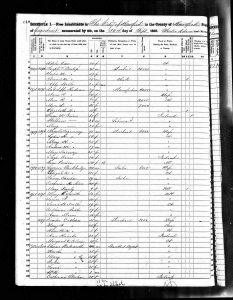 “Charles Sigourney: His Influence in Hartford and at Trinity College”
“Charles Sigourney: His Influence in Hartford and at Trinity College”
Research
This research concludes that Charles Sigourney was a significant figure in Trinity College’s history. He is known for being a diplomat, prosperous Hartford merchant, bank president, college trustee, churchwarden, as well as known to some extent for his marriage to Lydia Sigourney. Sigourney is a critical figure in the study of the history of Trinity’s relationship to social, political, economic and cultural institutions of slavery. While he did not directly own any enslaved individuals, as a founding member of the college, it is important to try to understand his beliefs and goals for the institution. Sigourney was complicit in systems that benefitted from of slavery.
Sigourney had a significant influence on the college during its formative years. Sigourney provides a window into Trinity College’s ties to the capitalism of slavery. According to the 1840 census data, Sigourney had a free Black woman, Ann Prince, living in his house. In 1784, Connecticut passed an act of Gradual Abolition.[1] The act stated that, “children born into slavery after March 1, 1784 would be freed by the time they turned 25.”[2] As a result, slavery was practiced in Connecticut until 1848. This is important information to consider in trying to understand how Sigourney would have viewed Prince in his household, and his beliefs during the founding of Trinity. He was also the president of Phoenix National Bank, an institution that would have likely been providing funds to systems involved in or profiting off of slavery.
In order to understand Trinity’s past as it pertains to the present, it is vital to use this research to present a possible way for students to grapple with it in the future. This could be tackled by creating a first-year seminar course titled “Charles Sigourney: his influence in Hartford and at Trinity College.” The first-year seminar will study Sigourney’s role at Trinity in its beginning years, and likely fall under the History or American Studies departments. Further it will study key language specific to his role in Hartford: banker, philanthropist, diplomat. How these roles intersect with slavery is important to the understanding of Trinity and slavery in the first-year seminar. The course will seek to understand what those roles may have symbolized and entailed during their time period. The goal of this first-year seminar is to educate students early on in their Trinity career of some of the influences that our college was under in its formative years. The classroom setting provides a considered and thoughtful learning environment. Due to the connection that this seminar has to Hartford, it may be feasible to collaborate with the Community Learning Gateway Program with other first-year students. The burden of raising this conversation to other groups and members of the Trinity College community could be attempted together.
For the full research findings, click here:
[1] “Connecticut Abolitionists,” National Park Service, August 18, 2017, Accessed May 8, 2019.
[2] “Connecticut Abolitionists.”
